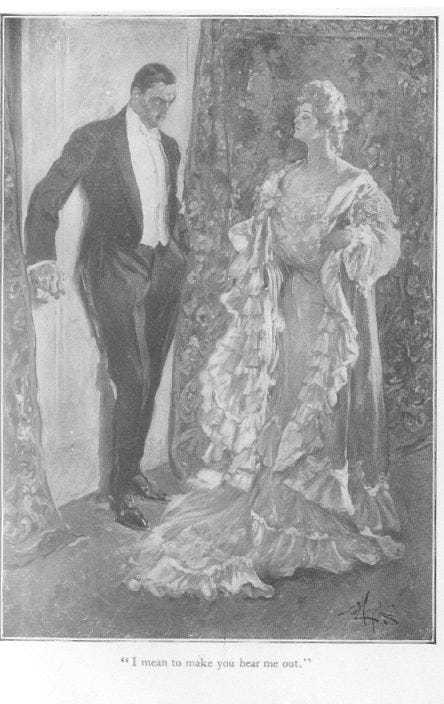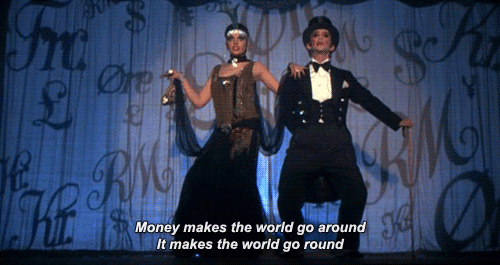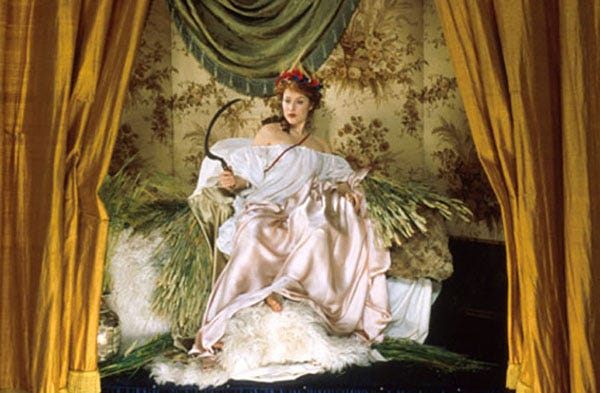The House of Mirth: Book One Chapters 9-15
It was Trenor himself who frightened her.

It's been a while since we've checked in on Miss Lily Bart. I apologize for the delay. Life and all its complexities hit me hard in the last couple of weeks. But I seem to have a handle on things again, so let's get back to Lily, Selden, and, most notably for this week, Gus Trenor.
But first, let's backtrack a little. At the end of Chapter 7, Judy Trenor puts Lily to work, having her pick up her husband, Gus, from the train station. On their journey back to the house, he mentions his luck with the stock market, all thanks to Simon Rosedale's tips. Lily takes this opportunity to ask Gus if he could take her small nest egg and use it to speculate on her behalf. He agrees but asks Lily to help encourage more congenial relations between the Trenor set and Rosedale.
"Well, all I can say is that the people who are clever enough to be civil to him now will make a mighty good thing of it. A few years from now, he'll be in it whether we want him or not, and then he won't be giving away a half-a-million tip for a dinner."
Trenor can see the writing on the wall: the old guard will be replaced by new money, and for Gus, it's better to stay on the good side of someone like Rosedale while he still needs old money folks like the Trenors to help launch him into good society. Money, who had it, who doesn't, and who knows how to get it plays a significant role in The House of Mirth - money makes the world go round, as they say.
Let's set all this to the side for a moment and return to where we left Lily.
In chapter nine, we finally meet Mrs. Peniston at her home, Richfield. Her home is clean and orderly, and the furnishings are heavy and old-fashioned. Lily describes the house as being "dreary as a tomb." Mrs. Peniston isn't one to socialize; she prefers for her nieces to head out into society and return home to her with a thorough rundown of whatever occurred at the gathering. This means that at Richfield, Lily has time to wander and ponder her situation in relative peace. After all this self-reflection, Lily’s self-doubt starts to shine through. "It was as she said to Selden - people were tired of her." Lily can feel her time running out. The pressure to secure a husband grows ever greater while her prospects dwindle.
Wharton gives us a glimpse into Mrs. Peniston's reflections on Lily and everything she's done for her. Mrs. Peniston firmly believes she's done everything she should do for her niece. She gives Lily an allowance, makes sure she's dressed in the best dresses and provides a home for her. What more should she do? In her mind, she’s done all that is proper and expected of her to assist her - the rest is up to Lily. All she asks is for Lily not to embarrass her, which will become an impossible ask as we inch toward Book Two.
In chapter ten, Lily is still struggling with her finances despite the help she's received from Gus Trenor. She turns down invitations to Bellomont and hides out at Mrs. Peniston’s to save some money. Her windfall from Trenor's speculation in the markets gives Lily a sense of freedom, but she's still mindful of its limitations.
"The fact that the money freed her temporarily from all minor obligations obscured her sense of the greater one it represented, and having never before known what it was to command so large a sum, she lingered delectably over the amusement of spending it."
It's nice to see Lily show a glimmer of prudence and even a moment of charity. She even talks herself out of buying a new dressing-case. But she’s still Lily, so she buys a new opera cloak instead. Is there no one who can teach her how to manage her money?
Unfortunately for Lily, her secret dealings with Gus have entered the rumor mill. Simon Rosedale invites her to the opera (good thing she has that new cloak) and tells her that Gus is being less than discreet about helping her invest in the stock market. To the old-money crowd, speculation is on par with gambling. It's also something that the new money set engages with and is, therefore, looked down upon, especially for a young unmarried lady like Lily. Tongues are wagging about Lily and Gus. There must be more to their arrangement than one friend helping another. Nothing in this society is done out of the goodness of one’s heart. There are always strings attached.
At the opera, Gus presses his case for "payment" from Lily for his financial assistance. He wants to spend time with her, but she keeps brushing him off. At first, he's quite tolerant of her rebuffs, but no more. Gus wants what he paid for and starts to pull the metaphorical strings of their arrangement. Everything in this world is an exchange of favors or money. Rosedale wants a way into New York society; he can't buy his way in, at least not directly. But he can give investment tips that, if they pan out, will be exchanged for seats at tables that were once barred to him. Lily unknowingly enters this system of favors when she asks Gus for help, and she must comply with the system or suffer the consequences.
In chapter eleven, we learn it's been a bad autumn on Wall Street, and many old money fortunes have been lost or greatly diminished. Meanwhile, men like Simon Rosedale and Welly Bry continue to reap the rewards of the markets. The winds of change are blowing through New York society. As the novel continues, the old guard will become more open to socializing with new money.
Meanwhile, life at Mrs. Peniston's is getting competitive. Lily and her cousin, Grace Stepney, are locked in a battle for their aunt's attention and favor. Lily has a leg up on Grace - she's fashionable and from a more wealthy branch of the family tree. However, wherever Lily goes, gossip will follow, and Mrs. Peniston cannot stand a scandal. Grace uses this to her advantage and lets slip that there are rumors about Lily and Gus, which Mrs. Peniston doesn't want to believe but also can't ignore. Unbeknownst to Lily, life is rapidly becoming a house of cards, ready to collapse at any moment.
"Miss Bart had in fact been treading a devious way, and none of her critics could have been more alive to the fact than herself; but she had a fatalistic sense of being drawn from one wrong turning to another, without ever perceiving the right road till it was too late to take it."
And thus begins chapter twelve and the infamous Tableaux Vivants at the Bry's. Lily's beauty shines as she poses as Joshua Reynolds’ Mrs. Lloyd. The men are all drawn to her - particularly Selden and Gus Trenor. Lily once again runs off to spend time with Selden, ignoring any other potential suitors, but also, Gus. Unfortunately, this will be her last night of triumph. Her beauty has whet Gus's appetite for her, and he is determined to collect on his investment.
Chapter thirteen opens on a bright morning the day after the Bry's party. Lily is filled with joy, but she's about to stumble further than ever. She receives two letters: one from Judy Trenor saying she's coming to town and asking her to visit that evening, and another from Selden setting up a meeting for the next day. While her thoughts are consumed with Selden and potential proposals, Lily is unaware of the trap that is being set for her by Gus.
In the remaining chapters of Book One, we watch Lily fall from grace. Gus Trenor tricks her into a clandestine meeting at his townhouse without his wife. Judy phoned to say she was too ill to come to town and asked Gus to cancel her plans with Lily, but instead, he seized on the opportunity to finally get Lily alone. During this surprise meeting, Lily learns that Gus was investing his own money, not hers (because she has none). He was giving her his profits amounting to nearly $9,000! Lily manages to save her virtue and escape the Trenor’s home but is spotted leaving Gus's house late in the evening by the worst possible person - Lawrence Selden. Lily has no one to turn to but Gerty Farish for comfort and support in her distressed state. The night ends with Gerty taking Lily in and trying to provide her with comfort.
When the new day dawns, everything changes for Lily. Selden has abandoned her. She tries to borrow money from Mrs. Peniston to pay back Gus, but Mrs. Peniston is appalled to find out her niece has been gambling and playing cards. She refuses to pay Lily’s debts and falls out of her aunt's favor. Lily is offered one life raft in the form of Simon Rosedale. He proposes to her later that day. It’s not a romantic proposal but a business proposition. Rosedale wants a wife who can launch him into society, and Lily needs a fortune. It should be a match made in heaven, but she cannot accept his offer.
"You are quite right, Mr. Rosedale. I have had bothers, and I am grateful to you for wanting to relieve me of them. It is not always easy to be quite independent and self-respecting when one is poor and lives among rich people; I have been careless about money, and have worried about my bills. But I should be selfish and ungrateful if I made that a reason for accepting all you offer with no better reason to make than the desire to be free from my anxieties."
I can't imagine many would have turned him down in this moment, yet Lily does.
Book One ends with Lily receiving a letter from Bertha Dorset inviting her to join her on a Mediterranean cruise. Lily accepts to escape all that has happened in New York. But we all know you can't run from your problems. We also know it's dangerous to trust Bertha Dorset.
There are a few key takeaways from Book One, and I’d love to hear your thoughts:
Lily remains absolutely friendless. The closest thing she has to a friend is Gerty, but even this relationship has its limitations. There is no one Lily can be open and honest with. Imagine how different things might have turned out for Lily. If she had someone, she could have told the whole truth about her dealings with Gus and what happened that night in his townhouse. Or even someone who could stick up for her when the gossip-mongers start tearing her down.
Lily may have been raised to be a beauty, but she was never taught how to move through the world like anything other than an object to be admired. Bertha knows how to manipulate situations and people to get what she wants and protect her reputation. Unfortunately, Lily has been left adrift in a sea of vipers. How is she expected to survive? Even Mrs. Peniston is no help.
"In her youth, girls had not been supposed to require close supervision. They were generally assumed to be taken up with the legitimate business of courtship and marriage, and interference in such affairs on the part of their natural guardians was considered as unwarrantable as a spectator's suddenly joining in a game."
Her aunt's standoff approach does nothing to help Lily navigate the world.
Lily has better morals than the rest of her set in some ways. She's not looking to trick or step on anyone to get what she wants. She doesn't approach every interaction like there is something to be gained. For people like Gus and Rosedale, everything is a business transaction: every dinner, opera invite, investment tip. Lily is a more benevolent person to her detriment. If Bertha had been in Lily's shoes at the end of Book One, Rosedale’s offer to give her all the financial stability in the world, she wouldn't have hesitated before accepting his proposal. Lily cannot scheme like Bertha. Lily seems to feel too much to hurt anyone knowingly - even if doing so would save her from ruin. In this society, having a heart and a moral compass is a hindrance, not a virtue.
There is a critical event in chapter nine that I have left out for now. The charwoman from Selden’s building visits Lily and sells her a pile of letters she found in his apartment. These are scandalous letters written by Bertha Dorset during her affair with Lawrence. Lily could use these letters to her advantage, but exposing Bertha would hurt Selden, something Lily cannot fathom. Lily has the letters tucked away for now, but they will play an important role in Book Two, so let us not forget them.
That’s all for this week. I’ll be back next week with thoughts on the first four chapters of Book Two.
Happy reading!
ERRATA: When I created the original reading schedule, I only had the audiobook available, which doesn’t separate Books One and Two. I updated the schedule to reflect the chapters more accurately. There should only be a slight shift in the weekly reading. Apologies for all the bumps during this first read of our Year with Edith Wharton.








I confess to being a little surprised to read in Chapter VII that Lily drives to the train station to pick up Gus in a four-wheeled, one-horse, run-about buggy, apparently on her own. I wonder how typical this was for the time. We read that Carry Fisher had originally intended to pick up Gus, and probably fleece him for some more cash, until Judy intervened to ask Lily to run this errand for her instead.
Are we to gather that it was common for young women of fashion in New York at the turn of the 19th century to drive a horse and buggy out in public on their own? Why not send a groom or someone else from the Trenor household staff to fetch Gus? Obviously, Edith Wharton wanted to arrange for Lily and Gus to be alone for a period of time, and thought that this was the best way to bring it off. I imagine it was probably a typical practice at the time, or else Wharton wouldn't have used it as a pot device. Still, it struck me as being a little unusual to find Lily driving a horse and rig out in public on her own.
I’m not surprised at Lily refusing Mr. Rosedale’s offer of marriage. For one thing, there’s his whole attitude and manner of speaking. “I’ve got the money,” he says, “and what I want is the woman—and I mean to have her too.” Rosedale talks as if he’s buying a horse. He also seems very sure of himself, as if he assumes all his money will make Lily a pushover for his offer. He doesn’t understand that no one likes being taken for granted.
Rosedale doesn’t have to declare, “I love you. Most ardently.” Nobody would believe that. But he could have at least sat down in Lily’s presence, instead of standing and leaning aggressively on his walking stick. He could have tried a softer approach, explored the possibility of shared interests and aspirations between Lily and himself, and basically shown her more respect.
As it is, Lily doesn’t refuse Rosedale’s offer outright. She says she needs more time to think about it, which Rosedale accepts as a better response than he’d bargained for. But Lily’s answer is also based on her expectation that Lawrence Selden will arrive at any minute and show her the way out of her predicament involving Gus Trenor and his $9000. When Lily sees a newspaper notice stating that Selden is aboard ship on his way to the West Indies, she seems to change her mind about Rosedale and begins to write him a note, only to stop when Bertha Dorset’s telegram arrives inviting Lily to join her on a Mediterranean vacation.
Another reason for Lily declining Rosedale’s proposal is, as you point out, that Lily still retains a higher moral sense than the Dorsets, the Trenors, and the rest of their social class. Although her life goal is to marry a rich man, it seems that Lily still hopes that somehow, she’ll be able to marry for love as well. There’s a part of Lily who Lawrence and Gerty speak of as “the real Lily”—the moral Lily—and this is the Lily who refuses to sink to the level of her peers by marrying only for money. It is this same inner moral standard that probably led her to sabotage her chances with Percy Gryce.